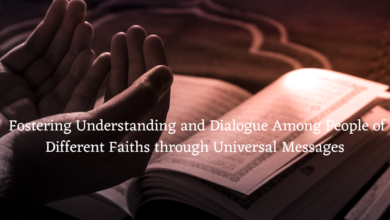

Introduction of Allahumma Barik
In the Islamic tradition, the phrase “Allahumma Barik” holds great significance and is often invoked by Muslims in various situations to seek blessings and goodness from Allah (God). This simple yet powerful expression is deeply rooted in the Quran and Hadith, and its meaning goes far beyond its literal translation. Let us explore the essence and implications of “Allahumma Barik” and understand its significance in the lives of millions of Muslims worldwide.
Meaning and Linguistic Understanding
“Allahumma Barik” is an Arabic phrase composed of three parts. “Allahumma” translates to “O Allah,” acknowledging the Almighty as the source of all blessings and mercy. “Barik” is derived from the root word “Barakah,” which signifies blessings and goodness. So, when Muslims say “Allahumma Barik,” they are asking Allah to shower His blessings and grace upon a person, place, thing, or an event.
Islamic Perspective and Usage
In Islam, seeking blessings from Allah is highly encouraged, and invoking “Allahumma Barik” is a way to demonstrate one’s faith, gratitude, and reliance on Allah’s benevolence. Muslims believe that Allah’s blessings can transform the ordinary into the extraordinary, bring success to endeavors, and provide protection from harm.
The usage of “Allahumma Barik” is widespread and versatile. It is often said when starting something new, like a journey, a business venture, or a new phase of life. Muslims also use it as a form of congratulation or expression of joy when they witness something good happening to others, like a wedding or the birth of a child. Moreover, “Allahumma Barik” is invoked when offering prayers or supplications, showing the acknowledgment of Allah’s role in the fulfillment of their needs and desires.
Emphasizing the Importance of Seeking Blessings
The Quran and Hadith emphasize the significance of seeking blessings from Allah. In Surah Al-A’raf (7:96), it is stated, “If only the people of those towns had believed and been God-fearing, We would certainly have opened up to them blessings from the heavens and the earth.” This verse highlights the connection between righteousness, faith, and the abundance of divine blessings.
Prophet Muhammad (peace be upon him) also encouraged seeking blessings through supplication and recognizing Allah’s role in every aspect of life. He taught his companions various prayers seeking Allah’s blessings, such as before starting a meal, upon entering the home, and when wearing new clothes. This serves as a reminder for Muslims to be mindful of Allah’s presence and to seek His favor in all their actions.
Barakah: A Transformative Force
The concept of Barakah extends beyond material wealth and prosperity. It encompasses spiritual, emotional, and social aspects of life. When a person or a place is blessed by Allah, it becomes a source of goodness and benefit for others. This is why seeking Allah’s blessings for oneself and others is highly encouraged in Islam.
Barakah can be witnessed in various ways. In personal matters, it can manifest as contentment, ease in fulfilling responsibilities, and increased productivity. In financial matters, it can result in wealth growing and providing more significant returns with limited resources. In relationships, it can strengthen bonds and foster harmony.
Gratitude and Humility
“Allahumma Barik” also instills a sense of gratitude and humility in the hearts of believers. By acknowledging Allah as the source of all blessings, Muslims are reminded of their dependence on Him and His infinite mercy. This fosters a sense of gratitude for the blessings one receives and humbleness in times of success and prosperity.
Community and Brotherhood
Seeking blessings for others through “Allahumma Barik” fosters a sense of community and brotherhood among Muslims. When we pray for the well-being and prosperity of others, we demonstrate compassion and selflessness. This practice strengthens the bond between individuals and reinforces the concept of the Ummah (the Muslim community) working together as one cohesive unit.
Conclusion
“Allahumma Barik” is a profound phrase that holds deep spiritual meaning and significance in the lives of Muslims. It serves as a constant reminder of Allah’s presence, benevolence, and His role as the bestower of blessings. Through seeking Allah’s blessings, Muslims express their faith, gratitude, and humility while nurturing a sense of community and compassion for others.
By invoking “Allahumma Barik,” Muslims strive to infuse their lives with the transformative force of Barakah, hoping for success, protection, and an abundance of goodness in all aspects of life. The power of this simple phrase lies in its ability to connect individuals with their Creator and foster a profound sense of purpose and meaning in their daily endeavors. As Muslims continue to seek blessings and offer prayers for one another, the spirit of unity and love within the Ummah remains strong and resilient
What does “Allahumma Barik” mean?
“Allahumma Barik” is an Arabic phrase used in Islamic tradition to seek blessings from Allah (God). It is a supplication, with “Allahumma” meaning “O Allah” and “Barik” referring to blessings and goodness.
How do Muslims use “Allahumma Barik” in daily life?
Muslims use “Allahumma Barik” in various situations. It is commonly said when starting something new, such as a journey, business venture, or a new phase of life. It is also used to congratulate and express joy on happy occasions like weddings or the birth of a child.
What is the significance of seeking blessings in Islam?
Seeking blessings from Allah is highly encouraged in Islam. Muslims believe that Allah’s blessings can transform the ordinary into the extraordinary, bring success to endeavors, and provide protection from harm. It also instills gratitude and humility in believers.
Can “Allahumma Barik” be used in prayers and supplications?
Yes, “Allahumma Barik” can be incorporated into prayers and supplications. Muslims often use this phrase to seek Allah’s blessings before or after offering prayers, acknowledging Allah’s role in fulfilling their needs and desires.
What is the concept of Barakah in Islam?
Barakah is a concept in Islam that refers to divine blessings and goodness. When a person, place, or thing is blessed by Allah, it becomes a source of benefit and goodness for others, extending beyond material wealth to include spiritual, emotional, and social aspects of life.
Can “Allahumma Barik” be used to pray for others?
Yes, “Allahumma Barik” can be used to pray for others. In fact, it is encouraged for Muslims to seek blessings for their fellow believers, as it fosters a sense of community, compassion, and brotherhood.
Is “Allahumma Barik” a form of gratitude and humility?
Yes, saying “Allahumma Barik” reflects gratitude and humility. By acknowledging Allah as the source of all blessings, Muslims express their dependence on Him and display thankfulness for the blessings they receive.
How does “Allahumma Barik” strengthen the sense of unity in the Muslim community?
When Muslims pray for one another using “Allahumma Barik,” it fosters a sense of unity and love within the Ummah (Muslim community). This practice demonstrates compassion and selflessness, reinforcing the concept of working together as one cohesive unit.
Can “Allahumma Barik” be used for non-Muslims?
While “Allahumma Barik” is commonly used within the Islamic context, Muslims may also pray for blessings and well-being for non-Muslims. Islam encourages kindness and benevolence towards all human beings, regardless of their faith.
How does invoking “Allahumma Barik” impact one’s personal and professional life?
Invoking “Allahumma Barik” in personal and professional endeavors is believed to invite divine blessings, which can lead to success, contentment, and an abundance of goodness. It also helps in developing a sense of mindfulness and reliance on Allah in all aspects of life.





